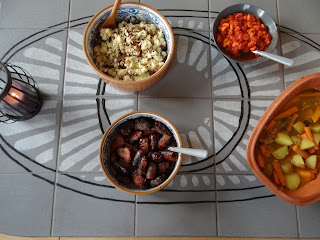an international potluck in Copenhagen's Nørrebro neighborhood
a bakery's organic bread offerings in the city center
a traditional Danish Christmas lunch in the Copenhagen suburbs
a sampling of herring at a Slow Food event
Thanks to school instructors and industry mentors, I discovered there are certain universal rules you can apply to all professional kitchens. Here is a short (although not exhaustive) list of kitchen commandments. While these tips are mostly common sense with a dash of industry insight, I hope this content is helpful to those just starting out.
1. Always leave a kitchen cleaner than you found it. Work as clean as you can, establish good habits, and treat your cutting board like a pristine surface. And beware when picking up large stock pots: if they are scorched underneath, they will put a big black stain on your white chef jacket when you pick them up. Classic rookie move (and I have the bleached chef's coats to prove it.)
2. Use every drop of product possible. If you ever have your own business, you'll think about every cent that goes towards your food cost, and the most thoughtful employees do this too. So scrape each and every last drop of nutella from that nutella jar before you throw it away.
3. Be willing to embarrass yourself. No one is born knowing how to filet a fish. Be willing to ask questions, admit what you don't know, learn from your mistakes, and embrace these humbling experiences with open arms. A kind restaurant colleague recently told me, "All chefs have screwed up way more than they've gotten it right." It takes a lot of practice to get to where you need to be, so find beauty in the frustrating but ultimately rewarding process.
4. Invest in high quality slip-resistant shoes. You're going to be on your feet a lot. A 50-year industry veteran once told me, "you can be cheap with other things, but not with your shoes." As much as you can afford to, spring for the good ones with lots of support.
5. Mise en place. It's a way of life. Prepare your ingredients in advance and stay organized. And remember that recipes can only take you so far-- you must also evaluate what you produce and know how to fix it if it's not right.
6. Take notes. Whenever possible, ask your chef how to do something only once. Always defer to how the chef you are working for wants the task done, even if a previous boss or teacher taught you a different method. Keep a little notebook in your back pocket and make it your kitchen bible. (For the record, my favorite kitchen notebooks are Moleskin's hard cover pocket size and I stock up on them when they go on sale.)
7. Learn from everyone. Respect each job in the kitchen. Especially if you want to be running the show someday, know how to work the dish machine, how to clean the fryer, and observe the way everything works in the operation. Be a sponge, absorb everything, and show appreciation for your kitchen teammates.
8. Respect your knives. Never try to catch a falling knife, it's a losing game. Keep them sharp. And be careful not to leave blades hanging out in a sink where they can injure someone. The most common knife you'll use is an 8 inch or 10 inch chef's knife, so it's practical to invest in one of those. And don't break the bank with your first purchase: you can get a decent starter knife for under $40.
9. Be vocal. Make yourself seen and heard in the kitchen, or else you're going to get cut, burned, or otherwise injured. Say "behind" when you're walking behind someone, "hot" when you're carrying hot pots and pans through the kitchen, or "sharp knife!" if you're walking through the kitchen with sharp objects.
10. Walk faster! Make your trips within the kitchen as efficient as possible and have a sense of urgency.
Finally, be bold and use common sense. Julia Child offered the best advice when she said: "The main thing is to have a gutsy approach and to use your head."
Finally, be bold and use common sense. Julia Child offered the best advice when she said: "The main thing is to have a gutsy approach and to use your head."








No comments:
Post a Comment